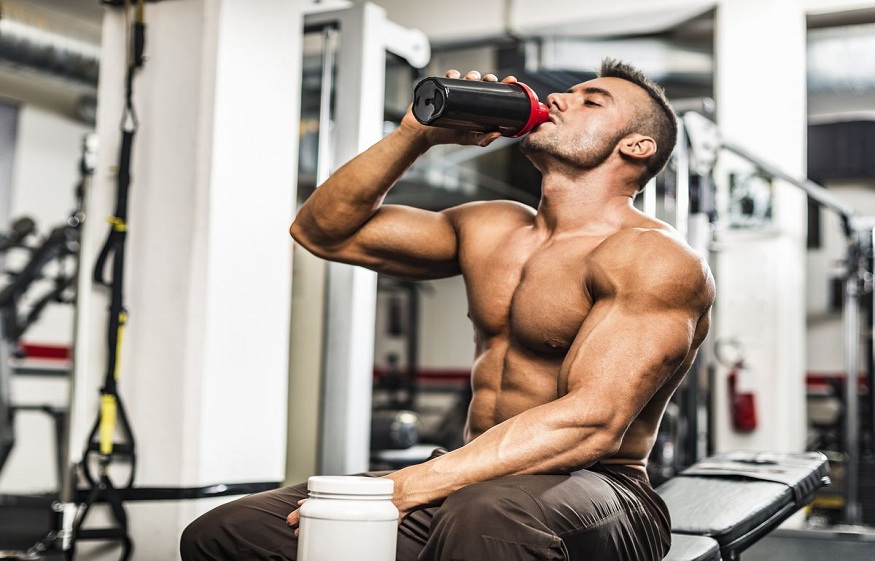The protein requirements when practicing bodybuilding are twice the recommended intake for a sedentary person, especially after 40 years.
What are proteins?
Most of our foods contain it. From a biochemical point of view, they are large molecules made up of chains of varying lengths of amino acids. All proteins, whether of bacterial, plant or animal origin, are made up of a group of 20 amino acids.
Role
Proteins are the “building blocks” of the body. They make it possible to manufacture muscles, bones, hair, nails, skin… All the organs, but also hormones, enzymes and antibodies… Dietary proteins are a source of energy (amino acids provide during their breakdown of energy in an amount equivalent to that provided by carbohydrates).
Protein requirements
The protein needs are daily, because the tissues are constantly renewed (at the rate of at least 250 to 300 g per day).
For a young adult, they are around The ANC* were calculated on this basis. For adults, the recommended nutritional intake of good quality protein is 0.8 g per kg of body weight per day (e.g. 44 g for a 55 kg woman and 60 g for a 75 kg man) . These needs are increased for athletes who wish to increase their muscle mass and performance.
The best sources of dietary protein (animal, vegetable)
A protein is of good nutritional quality if it contains the eight essential or indispensable amino acids – those that the body does not know how to manufacture and which must be provided by food – in the ideal proportions, that is to say in the proportions adapted to the needs of the body. The protein must also be perfectly digestible.
To assess the nutritional quality of a protein, two parameters must therefore be taken into account: its composition of essential amino acids and its digestibility.
The ideal is to vary the sources: animal proteins (meat, egg, milk) have similar characteristics: they are very digestible, they have high levels of essential amino acids with a profile fairly close to that of the needs of the ‘male.
Plant-based proteins come mainly from cereals (wheat, rice, corn) and legumes (chickpeas, beans, soybeans, lentils, broad beans). Their nutritional characteristics are more diverse than those of animal proteins. Their digestibility is on average slightly lower and varies enormously from source to source. Their content of essential amino acids is generally lower (around 40% of amino acids) and their profile is further removed from that of the body’s needs, but it is quite possible to cover protein needs. from plant sources, all you need to do is vary the foods you eat.
Bodybuilding: protein intake is essential
Muscles are made up mostly of protein. When we weight train, we strain our muscles and cause tiny damage to muscle tissue which then needs new dietary protein to repair. This repair involves a cellular process that leads to an increase in contractile proteins (actin and myosin) and in the number of sarcomeres, the filaments that line the muscle fibers. This increases the diameter of individual fibers and leads to muscle hypertrophy.
Protein promotes muscle mass gain
Bodybuilders often resort to protein-enriched drinks or supplements in an effort to support muscle mass growth. Studies show that in general, increasing your protein intake allows an increase in muscle mass and a significant reduction in fat, especially abdominal. It remains to be seen how much dietary protein you should have.
Strength training has many health benefits, since it helps to stay lean and fight diabetes. But if you want to gain mass and strength, you have to consume enough protein. According to the results of a study published in the British Journal of Sports Medicine, these needs go beyond the recommended intake, especially after the age of 40.
Many previous studies on the subject have focused either on a type of protein or on a specific population. In this new study, the researchers brought together the work carried out on the relationship between bodybuilding and protein intake. They considered 49 studies that lasted at least 6 weeks, with control groups, protein intakes and varied populations.
The results clearly show that you need to consume a lot of protein to increase muscle size and strength. Thus, men and women who consumed more protein gained 10% more muscle strength and 25% more muscle mass compared to control groups.
Protein supplements to improve athletic performance
This represents approximately 130 grams of protein for an 80 kilogram man and almost 100 grams for a 60 kilogram woman. Well beyond the recommendations for the general population which are around 0.8 grams/kg of body weight. Some authors advise 2 to 3 grams of protein per kilo of weight, but consuming more than 1.6 g/kg would not provide additional benefits on muscle mass and strength. All proteins are likely to be effective. Thus, chicken, beef, yogurt, quinoa, soy… can help develop muscle mass. Proteins are not only found in animal products. Vegetarians and vegans also have good quality protein at their disposal.. Ultimately, no matter when protein is consumed, before or after training, the results for your body are the same . You can supplement your food intake with proteins in the form of food supplements such as whey (whey protein), or even soy and rice powder proteins.
Note that the researchers found that these tips to eat enough protein were particularly suitable for people over the age of 40 who did not consume enough protein and who therefore did not take enough advantage of the benefits of bodybuilding.

